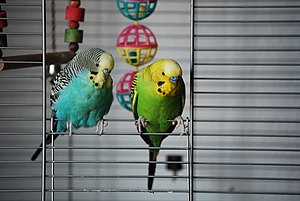Culture & Entertainment
3 birds that make great pets

Culture & Entertainment
3 birds that make great pets
Did you know that birds make great pets?
Most are as social as dogs (without the shedding) and can be as mischievous as cats (without as much attitude), and they pretty much groom themselves; all you really have to do is provide a birdbath for their cage and trim their nails occasionally.
And birds make great first pets for kids, not the least because they set a good example come dinnertime: they LOVE to eat their veggies.
Here are three birds that would love to make your home their home.
BUDGIES
More formerly known as budgerigars, they are also called parakeets. They are flock birds, and therefore incredibly social creatures that do best when they live with a friend.
[caption id="" align="aligncenter" width="300" caption="Budgies love their hanging toys (image via Wikipedia)."] [/caption]
[/caption]
Lifespan: 7 to 20 years
Cost: $10 to $20 for one budgie
His accommodations: A long rectangular cage (from $60) is ideal, complete with various perches (from $2). Caution: Steer clear of wooden cages, as a budgie is likely to chew his way through it.
His meal plan: He'll dine on a mix of budgie seed mix (available at grocery stores and pet food stores; from $3), as well as whole grains, greens, fruit and legumes.
His entertainment: His cage should be tricked out with hanging toys and mirrors (from $2 each) and spinning bells (from $6), which will stimulate his senses. A budgies is a social butterfly and will need time out of his cage to mingle with people.
Yes, but can he talk? With some repetition and patience, you can teach your budgie some words and phrases.
COCKATIELS
Don't let their quiet nature fool you: cockatiels love human attention. They will also let you rest in peace: they need at least 10 hours of sleep a night.
 [/caption]
[/caption]
[caption id="" align="aligncenter" width="240" caption="A cockatiel enjoys a variety of food (image by Mark Goodall via Flickr)."] [/caption]
[/caption]
Lifespan: 15 to 20 years
Cost: $20 to $100 for one cockatiel
His accommodations: His cage (from $40) should be at least twice his wingspan so he has plenty of room to fly around and get his daily workout in. Set his home in a high-traffic area so there's a constant buzz of human companionship for him to engage with.
His meal plan: He'll enjoy a feast of seeds and pellets (from $4) for starters, cuttlebone to supplement his calcium intake (from $3), as well as fresh fruit and veggies. Unsweetened cereal and unsalted nuts make good treats for him as well.
His entertainment: Like budgies, cockatiels love their toys. Hanging toys and mirrors (from $2 each) will amuse them, as will simple household items such as toilet paper rolls and clothespins.
Yes, but can he talk? Talk, no, but he can be trained to mimic whistles, voices and noises.
FINCHES
Finches are a more timid bird and may actually prefer the company of another finch to a human.
Lifespan: 5 to 9 years
Cost: $10 to $40 for a pair of finches
His accommodations: His cage (from $50) should be long and wide so he has ample room to fly around. Like for all birds, there should be plenty of perches (from $2) in the cage for him to fly on to (and maybe even give him a change of scenery).
His meal plan: A finch has an incredibly active metabolism and will consume 30 per cent of his body weight each day. Seeds (from $7) are a good start, but for a complete diet he'll also need fruit and veggies, as well as a protein source such as boiled eggs and crushed eggshells (you can also buy egg granules for about $8 at a pet food store).
His entertainment: Unlike budgies and cockatiels, finches aren't so easily amused by toys. You can try hanging one or two, but making sure he has plenty of places to perch in his cage is just as likely to make him happy.
Yes, but can he talk? Better – he can sing!
Do you have a pet bird? If not, would you like to have one?
 [/caption]
[/caption]
















Comments